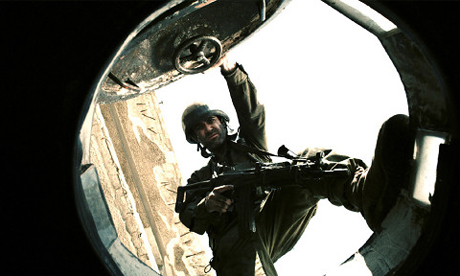Lebanon

Lebanon: a claustrophobic war drama
Lebanon is not a wartime picture on the scale of a Saving Private Ryan or a Letters to Iwo Jima.
Rather rather it is based on four soldiers posted in a F-15 army tank, and the characters and tension therein make the feature no less substantial than its Hollywood predecessors.
The story is contained with the tank and such is the clever artistry of the direction of Samuel Moaz you never once feel like any angle is left uncovered. At times you may become so immersed in the film that the claustrophobics may even lose themselves for a moment. It is an intense 90 minutes.
Tank commander Assi is accompanied by the outspoken and rebellious Herzol and the tank driver Yigal. The newcomer to the team and perhaps the most central character Shmulik (Yoav Donat) is has the role of shooter.
Typical of stressful situation when four people are enclosed in a confined area; tempers flare and personalities clash as their external surroundings become hostile and decisions have severe consequences.
Kept on edge by their chief commander Gamil (Zohar Shtrauss), the soldiers become desperate as their duties start to have a psychological effect on them.
Shtrauss, in particular plays his role with distinction and keeps the delicate balance between a strict and uncompromising officer and a trustworthy, compassionate team player.
As the film gathers pace we get to see the characters develop as each soldier reaches breaking point.There are times of unity in the most extreme of circumstances as they get to know each other, but you get the sense that not all of them knew the reasons why they were killing, and who was innoncent or not.
The tank is driven through the streets of Lebanon towards their final destination, the safe haven of St Tropez; there are violence scenes of killing and mass murder along the way, as they clean up any leftovers remaining after the air squad’s attack. Signs of secrecy and deception creep in, as orders are made, seemingly without any reason or understanding.
Moaz keeps this a current theme throughout the picture and as usual with European films of this nature, treats the audience as intelligent adults. The shots are close up, as if to give us the same sense of emotion the soldiers experience. Almost every possible situation and human emotion as been covered in this picture and Moaz certainly takes no prisoners as he tackles the conundrums that every soldier must face during war. The direction and film style is like no other and is very unique in its execution.
As a pointer to the guiding principles of life, Lebanon gives us a timely reminder that in whatever situation you need to look deep in yourself and show strength in adversity. However, this film is no history lesson; nor does it educate us on the political reasons behind what unfolds in this film, but it does show the reality of war our heart, character and courage are tested to the extremes, and director Samuel Moaz gives the audience a wartime picture that’s not easy to forget.
